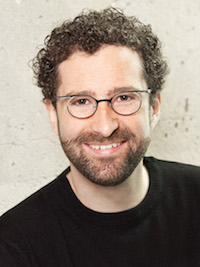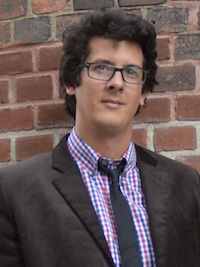News
» Go to news mainTop scholars join School for Resource and Environmental Studies
Research in the School for Resource and Environmental Studies (SRES) is about to get more exciting, with three new postdoctoral fellows beginning their terms this year. Dr. James Steenberg and Dr. Zhe Liu won two of Dalhousie’s eight Killam fellowships, and Dr. Brendan Haley secured a Banting fellowship, one of approximately 25 given by SSHRC throughout Canada. The three new fellows will be working with SRES faculty on their research.
Dr. Peter Tyedmers, director of SRES, proudly notes that the school secured 25% of Dalhousie’s Killam scholarships. “SRES is extremely fortunate to have attracted three such highly skilled early career scholars,” he says. “With their supervisors they will make substantial contributions to knowledge and the scholarly environment we, and the students we attract, enjoy.” Each of the new fellows brings his own interests and background to an aspect of environmental research.
 Dr. Brendan Haley was surprised to win a Banting postdoctoral fellowship, and cites working with SRES as one reason he was successful: “A big part of the criteria is not just that you have a good project but that you have the right place to do it.” Haley is researching Nova Scotia’s decision to begin an energy transmission project between Nova Scotia and Newfoundland, and the policy environment around the project. “A transmission connection like this creates the technical potential for Nova Scotia to really further carbon reductions,” explains Haley, “because the hydroelectricity will add some much-needed flexibility to the electricity system.” Nova Scotia’s project, Haley says, may provide lessons to the rest of Canada on connecting provinces with different forms of energy.
Dr. Brendan Haley was surprised to win a Banting postdoctoral fellowship, and cites working with SRES as one reason he was successful: “A big part of the criteria is not just that you have a good project but that you have the right place to do it.” Haley is researching Nova Scotia’s decision to begin an energy transmission project between Nova Scotia and Newfoundland, and the policy environment around the project. “A transmission connection like this creates the technical potential for Nova Scotia to really further carbon reductions,” explains Haley, “because the hydroelectricity will add some much-needed flexibility to the electricity system.” Nova Scotia’s project, Haley says, may provide lessons to the rest of Canada on connecting provinces with different forms of energy.
Haley, who studied public policy at Carleton University and environmental studies at York University, has experience in Nova Scotia’s energy sector and cites this as being helpful in achieving the fellowship. He adds that he received invaluable assistance from Dr. Susan Haydt, research facilitator in the Faculty of Management: “She should go on the list of reasons I received it.” Haley will be conducting his research under the supervision of Dr. Michelle Adams, with whom he has worked before on projects such as the now-defunct Eco-Efficiency Centre. “Brendan’s decision to take up the Banting fellowship—one of the most prestigious scholarships that can be awarded to a new Canadian scholar—at SRES both highlights and enhances the level of scholarship in our unit,” says Adams. “Our students are excited to have an energy policy scholar of his calibre as part of our community.” Haley is looking forward to working with other SRES faculty as well, and to learning from other faculties at Dalhousie.
 Hailing from China and currently finishing a Canada–China postdoctoral fellowship, Dr. Zhe Liu will move straight into his Killam fellowship at SRES in January. Liu’s research focuses on eco-industrial development strategies, a form of sustainable development that has been on the rise especially since the COP21 Sustainable Innovation Forum in France in 2015, when nations pledged to mitigate the harmful effects of human industry on the environment. Liu is establishing a model to measure the strategies’ effects on curbing greenhouse gas (GHG) emissions around the world. “Different eco-industrial development strategies mitigate GHG to different degrees, but there is a gap in knowledge in this field,” he explains. Liu aims to start filling in that gap.
Hailing from China and currently finishing a Canada–China postdoctoral fellowship, Dr. Zhe Liu will move straight into his Killam fellowship at SRES in January. Liu’s research focuses on eco-industrial development strategies, a form of sustainable development that has been on the rise especially since the COP21 Sustainable Innovation Forum in France in 2015, when nations pledged to mitigate the harmful effects of human industry on the environment. Liu is establishing a model to measure the strategies’ effects on curbing greenhouse gas (GHG) emissions around the world. “Different eco-industrial development strategies mitigate GHG to different degrees, but there is a gap in knowledge in this field,” he explains. Liu aims to start filling in that gap.
So why SRES? “Dalhousie is famous around the world and there are some excellent scientists at SRES,” says Liu, who completed his PhD at the University of Chinese Academy of Sciences. In particular, Liu has worked with Adams and with Dr. Ray Côté, a professor emeritus at SRES, both of whom are globally active in this field. “It is pleasant to work with Michelle Adams, who is glad to accept new ideas,” he says. The two have already collaborated on successful papers. Adams is thrilled to work with Liu. “His level of understanding and innovative contribution to the field of industrial sustainability suggest he has a bright career ahead of him,” she says.
Reflecting on why he might have been chosen for a Killam fellowship, Liu cites his scientific achievements, but also the appetite for studies like his. “My research is on an urgent topic in the world,” he says. “Currently, GHG emissions from industry are high around the world. Eco-industrial development is considered part of a solution to reduce these emissions.”
 Another Killam fellow, Dr. James Steenberg, will be conducting research on urban forestry. Steenberg’s connection with SRES began during his undergraduate studies, when Dr. Peter Duinker supervised his thesis. He continued to research with Duinker over the years. After completing his PhD at Ryerson University, Steenberg applied for the Killam fellowship and has now returned.
Another Killam fellow, Dr. James Steenberg, will be conducting research on urban forestry. Steenberg’s connection with SRES began during his undergraduate studies, when Dr. Peter Duinker supervised his thesis. He continued to research with Duinker over the years. After completing his PhD at Ryerson University, Steenberg applied for the Killam fellowship and has now returned.
Aside from his educational background in environmental science and management, Steenberg spent nine months on a Fulbright scholarship working with the U.S. Forest Service. His research addresses the issue of urban forestry and climate change. He will use ecological modeling to look at urban forests to see “how we adapt them to climate change, and also how we can adapt cities to climate change using forests.” It might be possible, says Steenberg, to use cities to establish tree species that will better survive in future climates.
Duinker is thrilled to have Steenberg back at SRES. It was sad to lose him as a graduate student when he left for Ryerson, says Duinker. “Here we are, with my dream come true,” he says. “James landed the prestigious Killam PDF award and will work on a range of urban-forest topics at SRES.” Steenberg sees SRES as a unique place for research, partly because of its interdisciplinary nature. “The disciplinary breadth that the faculty and students bring is unique,” says Steenberg. “Taking an intersectional approach, bringing in geography and urban studies—the capacity to have interdisciplinary perspectives from your supervisor and department, more broadly, is huge here.”
Recent News
- Professor M. Ali Ülkü receives 2024 Archibald Award
- Project to address harmful language relating to Indigenous peoples receives prestigious Mellon Award
- Four decades of friendly hellos
- Students speak with passion about recipients of Teaching Excellence Award
- Brothers, and Dal alums, adapt and learn to achieve career success
- Najah Attig and Oumar Sy win prestigious Graham and Dodd Scroll Award
- Curiosity in human behaviour leads Huiyan Liu (MSc’23 ) to a PhD
- In Memoriam – Dr. James R. Barker
